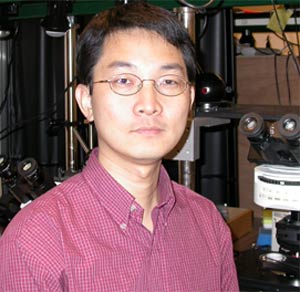 |
Haocheng
Zheng, Ph.D.
B.E.
Electrical Engineering, Beijing University, China, Posts Telecommunications
M.S. Electrical Engineering, Beijing University, China, Posts Telecommunications
Ph.D. Electrical Engineering, Tsinghua University, China.
|
|
|

|
After
my Ph.D., I worked for the Center for Research and Education on Optics
and Lasers (CREOL), University of Central Florida and then as a Senior
Optical Engineer for Confluent Photonics Corporation. Since coming to
work with Sanford in 2002, we have assembled an evanescent field fluorescent
microscope based on total internal reflection, a magnetic tweezers,
and a homebuilt laser scanning confocal fluorescence microscope (SCFM).
We have submitted a patent on certain parts of operation of the SCFM.
I am currently collaborating with Syam Anand, of the Saleem Khan lab,
on experiments with helicases. I attended the Paris Summer Physics School
in 2005.
|
- Tomschik, M.,
Zheng, H., van Holde, K., Zlatanova, J. and Leuba, S. H. Fast, long-range,
reversible conformational fluctuations in nucleosomes revealed by
spFRET. Proc. Natl. Acad. Sci. USA 102, 3278-3283, 2005. Highlighted
in Biophotonics International (March 2005 issue, p. 10).
- Zheng, H., Tomschik,
M., Zlatanova, J. and Leuba, S. H. Evanescent field fluorescence microscopy
(EFFM) for analysis of protein/DNA interactions at the single-molecule
level. In Protein-protein interactions, a molecular cloning manual,
2nd ed. (E. Golemis and P. Adams, Eds.) Cold Spring Harbor Laboratory
Press, Cold Spring Harbor (by invitation) Ch. 20, pp.1-16, 2005.
- Manuscript in
preparation: Zheng, H. and Leuba, S. H. Homebuilt scanning confocal
fluorescence microscope for the study of chromatin. Invited for Methods,
K. Luger, Ed.
|